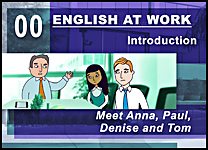Unit 3: English You Need
Exams, news, pronunciation, teachers' tips, learners' questions
Select a unit
- 1 English You Need
- 2 English You Need
- 3 English You Need
- 4 English You Need
- 5 English You Need
- 6 English You Need
- 7 English You Need
- 8 English You Need
- 9 English You Need
- 10 English You Need
- 11 English You Need
- 12 English You Need
- 13 English You Need
- 14 English You Need
- 15 English You Need
- 16 English You Need
- 17 English You Need
- 18 English You Need
- 19 English You Need
- 20 English You Need
- 21 English You Need
- 22 English You Need
- 23 English You Need
- 24 English You Need
- 25 English You Need
- 26 English You Need
- 27 English You Need
- 28 English You Need
- 29 English You Need
- 30 English You Need
Session 4
Welcome to The Teachers' Room. The show all about teaching practice. Grab a cup of coffee, pull up an armchair and relax. Learn something new, remember something fundamental or just have a giggle.
Activity 1
The Teachers' Room
Top tips for teaching vocabulary
What happened to Sian's trousers and why was she embarrassed about it? Find out in this video which is full of ideas for making sure your students learn vocabulary effectively.
Watch the video and complete the activity

___________________________________________________________________
Did you like that? Why not try these?
___________________________________________________________________
Introducing Vocabulary
Student-centred
It's often a good idea to use a student-centred approach to teaching vocabulary. Rather than just handing over the meaning to the students, make they work for it in some way. This could consist of a matching exercise, looking at pictures, listening to music or watching film, mime, or any other engaging way. Make sure they have a chance to get it correct though! It's not fair if they can't win!
Teach vocabulary in context
Vocabulary with a strong context is much easier to understand, more meaningful and much more memorable. Try to present vocabulary in sentences which support, underline and help to explain the target language – such as 'After the wedding, they went to the Carbbean on their honeymoon.'
As Sian did in the video, learners have a good chance of being able to deduce the meaning of the word honeymoon from the context. Teaching learners to do this promotes learner independence and makes them much less reliant on the teacher and more able to use their own skills.
Eliciting Vocabulary
Sometimes it is necessary to elicit vocabulary from the group to support an upcoming activity, such as a reading or listening. There are many ways to do so easily. It is important to pick the correct method depending on the circumstances and word. Choosing to mime the colour red, would not be a good choice!
You can use:
Realia - real objects
Mime or act
Use a cline - a scale which goes from one extreme to another
Explain using a scenario
Whichever you choose, don't forget to concept check that the group has fully understood the meaning of the target language. You can do this by asking CCQs, or concept checking questions.
Meaning is not enough
It's not enough just to teach learners the meaning of a word. In order to use a word, a learner will need to know its collocations at the very least. What are its prepositions, if it has any? What verbs or other word combinations is it commonly paired with?
Other ideas include:
Formality
Spelling
Pronunciation - word stress / connected speech
Synonyms & Antonyms – words with similar or opposite meanings
Connotation – does the word have positive or negative associations?
To do
Try our quiz to see if you've picked up our tips.
The Teachers' Room Quiz
5 Questions
Check what you've learned by selecting the correct answer to each question.
Help
Activity
Check what you've learned by selecting the correct answer to each question.
Hint
A strong context has a more identifiable meaning…how would this help learners?Question 1 of 5
Help
Activity
Check what you've learned by selecting the correct answer to each question.
Hint
Sian mentions this after the first slide.Question 2 of 5
Help
Activity
Check what you've learned by selecting the correct answer to each question.
Hint
Because a student can say the word, it means that they understand it 100%, right?Question 3 of 5
Help
Activity
Check what you've learned by selecting the correct answer to each question.
Hint
How can we get students to begin using the vocabulary as quickly as possible?Question 4 of 5
Help
Activity
Check what you've learned by selecting the correct answer to each question.
Hint
Connotation is the positive or negative perception of a word. How would making a wrong choice cause a leaner difficulty?Question 5 of 5
Excellent! Great job! Bad luck! You scored:
Get involved
Well, those were just a few ideas that we here at BBC Learning English had, but we know that you teachers out there have lots of fantastic ideas too, and we'd like you to share them with us and everybody else.
If you have a great tip or technique for teaching vocabulary, or anything else, please email us at learningenglish@bbc.co.uk. Your email could be posted here on this page, or may even be mentioned in our show.
We are also looking for video tips to include in the programme. In order to do this, please include whether or not you'd like to be included for video with your tip.
Francesca, Italy
To teach English I videotape my students and let them watch and comment on their on performance!I also let them record long sentences using whatsup so that they can listen to themselves and improve. It is amazing how this way they can detect mistakes and improve their fluency.
This is a great way to get students to pay attention to and self-analyse what they are saying and can lead to a huge improvement in accuracy. The use of everyday technology and social media to do this, is inspired. Well done and thank you, Francesca.
End of Session 4
Next up is Learners' Questions, our brand new series, where we choose one question sent in by an English language learner, and provide an answer. What will this week's question be? Join us in Session 5 to find out.
Session Vocabulary
Introducing Vocabulary
- Use a student-centred approach
- Teach vocabulary in context
- Elicit vocabulary using various techniques
- Meaning alone is not enough


